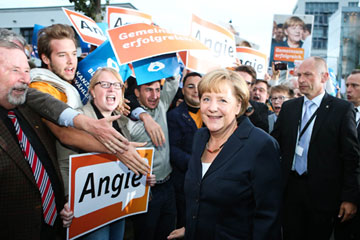
German Chancellor Angela Merkel greets her supporters outside a studio ahead of the TV debate in Berlin, Germany, Sept. 1, 2013.
(2 of 4)
Her critics say that is happening already on Merkel's watch. Greece isn't the only country that has been slow to make structural reforms. Merkel has governed in what she calls "small steps," avoiding the sort of big, transformative initiatives that might, for example, bolster Germany against challenges like its rapidly aging population.
Merkel's opponents hope her record of incrementalism will lose her the election. She seeks to counter their attacks with something rarely seen in postwar Germany--a campaign based on personality. That's startling because Merkel, under close scrutiny since she took the CDU's helm in 2000, remains an enigma. More than any other Chancellor of modern times, Merkel is Germany, personifying the nation's seemingly contradictory impulses--to be a world power and, at the same time, keep a low profile.
A Star in the East
Templin sits encircled by Medieval city walls and bounded by something less tangible: a sense of small-town reserve. Curtains twitch. Strangers are immediately conspicuous. The focus on the Kasner family when they settled in this corner of East Germany with their baby daughter in 1954 was intense. They were anomalies: Westerners choosing to live in the East. Not only that, but Horst Kasner was a Protestant pastor who saw it as his mission to work in the GDR and so lived under constant suspicion of sedition.
His daughter Angela learned to blend in to the point of near invisibility. In school, apart from one pivotal, traumatic moment, she stood out only for her scholarship. She took gold at a regional mathematics Olympiad, an annual competition pitting schoolkids against one another in academic subjects. She also twice won the top prize for Russian at the Olympiad. Erika Benn, the teacher who coached her to victory, says her star pupil easily mastered the language but struggled to acquire the interpersonal skills to sell a Russian poem. "She wouldn't even look up," says Benn. "I said to her, 'Can't you smile a bit?'"
It may seem counterintuitive that a girl without natural social skills should grow up to beguile so many, but you only have to see Merkel's fans gathered in Recklinghausen to appreciate the affection she inspires. "I find her wonderful, not just as a politician but a strong woman," says Jil Schulden, 19, a recent high school graduate. Such sentiments are commonplace in Germany and across a wide demographic.
There are criticisms, certainly. She's acquired several nicknames: "Merkiavelli" and "the Black Widow," for her ability to sidle up unnoticed before delivering a deadly bite. To her supporters, she's Angie. But everyone in Germany knows her as "Mutti," mommy.
For many Germans, it's an endearment and a reflection of their lingering surprise that they put Merkel in charge in the first place. When she ran for the chancellorship in 2005, "the main question in the campaign was 'Kann die das?' Is she able to do this? With a negative touch. Nobody is asking that anymore," says Ursula von der Leyen, who has served as a minister in both Merkel governments.
